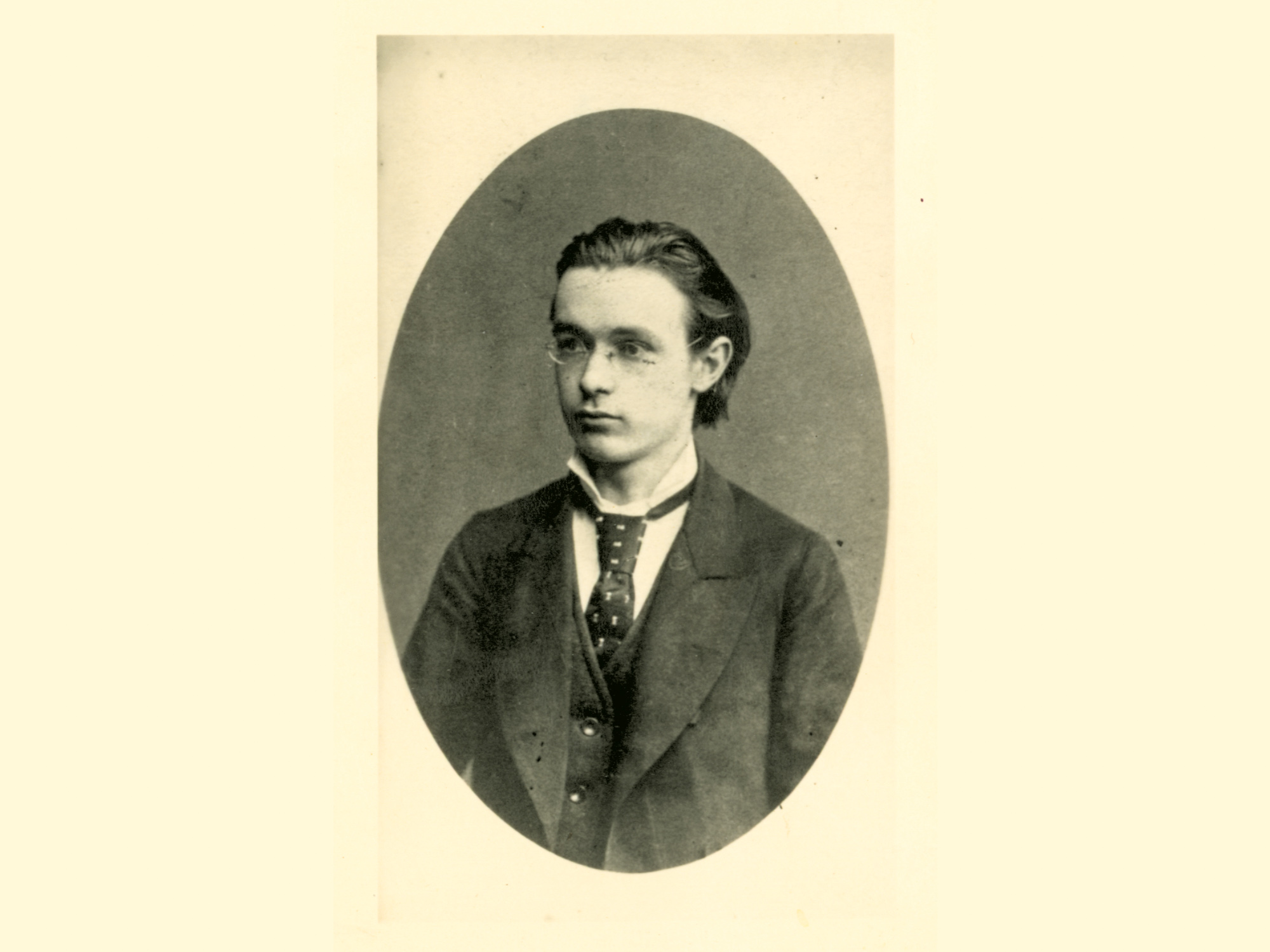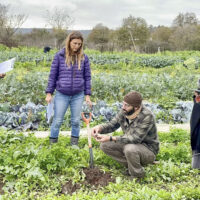Marginalia on Rudolf Steiner’s Life and Work.
Rudolf Steiner studied for eight semesters [1879–83] at the Technical College in Vienna—as a student of the “General” Department, which existed alongside the specialist departments: The School of Engineering, the School of Architecture, the School of Mechanical Engineering, and the School of Chemistry. The General Department encompassed all subjects that could not be clearly assigned to one of the four existing specialist schools. Around 1880, this included mathematics, descriptive geometry, and physics, as well as general and supplementary subjects, such as German language and literature, history, art history, national economics, law, foreign languages, etc.1
Unlike their classmates in the specialist departments, students in the General Department did not have to complete a fixed curriculum nor pass a final or, for example, a state examination. They didn’t have to and couldn’t—because it wasn’t even provided for this department. Neither was the “absolutorium,” the certificate of completion of studies which documented that one had attended all the lectures, seminars, and practicums designated for the respective course of study. The absolutorium was the prerequisite for registering for the state examination.

Final state examinations were only introduced at the Technical College in Vienna in the academic year 1878/79. The examinations were initially still optional and were thought of as professional qualifications; there was no entitlement thereby “to use an exclusive academic or professional title.”2 Until well into the twentieth century, there was only one academic degree in Austria, namely the doctorate, which in the nineteenth century could only be obtained by a graduate of a Gymnasium [a secondary school emphasizing the classics]. The doctorate was only introduced at the Technical College in Vienna in 1902.3
In Rudolf Steiner’s first academic year, 1879/80, of the total 1585 students, only 166 underwent the final state examinations. What seemed to be of greater importance at that time were the so-called individual examinations in the subjects taken. The number of these examinations was initially reported in the Annual Report of the Technical College 1879/80, sorted according to the departments of the Technical College. In the General Department, for example, a total of 149 students took 509 individual examinations4—eight of them by Rudolf Steiner, who thereby had a very high examination quota.5 Even so, he also had to continuously substantiate his academic accomplishments in order to receive the so-called Ghega Scholarship awarded to him by the Austrian Association of Architects and Engineers.
Rudolf Steiner also took many of these individual examinations in the following years: six in the 1880/81 academic year and five in the 1881/82 academic year. Ten of his total nineteen individual examinations were graded “Excellent,” three “Very Good,” and six “Good.” In his final year of study, he still took twelve subjects but did not sit an examination in any of them. Presumably, he was prevented from continuing to study as intensively as in the first three years due to his work on editing Goethe’s Scientific Writings.
Rudolf Steiner’s enrollment in the General Department was related to his goal of studying to become a teacher at a Realschule [“Real School,” a secondary school emphasizing sciences, mathematics, and modern languages], as he reports in his autobiography, Chapters in the Course of My Life: “I decided to work towards a teaching position at a Realschule.”6 Concerning the “Realschule teacher training candidates,” the Program of the Imperial and Royal Technical College in Vienna 1879/80 states that they “belong to the General Department, if they should not prefer to obtain admission to a specialist school.” Perhaps Rudolf Steiner would have enrolled in one of the specialist schools (e.g., the School of Engineering) if he had had more time to study. “Studying mathematics and descriptive geometry corresponded to my inclinations. I had to dispense with the latter. For this study was combined with a number of practice lessons in geometric drawing during the day. But, in order to earn some money, I had to have time to give tutoring lessons. That allowed for listening to lectures, whose material one could read through, if one had to miss them, but not with regularly sitting through the drawing lessons at the school itself.”7 Descriptive geometry, which he would have loved to take, comprised four hours of lectures and ten hours of “constructive drawing” every week!8 Thereby, from the outset, it was precluded that he could study in one of the specialist departments, for descriptive geometry was part of the mandatory requirements in these (except in the School of Chemistry).

Still, even if no final examination was planned for the teacher training candidates as students of the General Department at the Technical College, after their studies, they would have to pass the teacher training examination introduced in 1849 for the intermediate and higher teaching positions. This comprised a written and an oral part, and stood under the directorship of a special state commission, independent from the Technical College.9 That Rudolf Steiner originally wanted to take the teacher training examination after the eighth semester is indicated by his letter of June 21, 1882, to his friend and former teacher Albert Löger: “Now, I will hopefully also have this last year of blandness at my unloved Technical College behind me. Then comes first the miserable examination of the masses of mathematical wisdom piled up in the libraries. When I think about citation work, void of spirit or reason, that is to come for me—I mean the writing—I dread it. Still, I must do it, I want to do it, I do it.”10
But, shortly afterward, he was asked to take up the publication of the volumes of Goethe’s Scientific Writings as part of Kürschner’s German National Literature. And so, Rudolf Steiner did not take the planned teaching examination directly after his studies. However, Karl Julius Schröer referred to him in his letters and postcards as a “teacher candidate” until the fall of 1889, indicating that he probably still had his original goal in mind for several years. In this sense, the fact that he stepped into a position as a home tutor with the Specht family in 1884 can also be seen as practical preparation for his aspired teaching profession. Probably, he only gave up this goal when it finally became clear that he would relocate to Weimar in 1890 in order to collaborate on the first complete edition of Goethe’s works.
Since a different career path opened up, there was no cause for Rudolf Steiner to still take the teaching examination. Moreover, under the changed circumstances, from May 1890, he pursued the doctorate diploma. He did need a dispensation for his doctorate at the University of Rostock in 1891, but not because he did not complete any final examinations, but rather because, in his earlier school years, he had no Latin lessons. (That he had acquired extensive knowledge of this language on his own did not count in this context). “I had the Realschule, not the Gymnasium, behind me officially (even though I had privately acquired for myself the Gymnasium education, taking private lessons in it). In Austria, that ruled out doing a doctorate.”11 In Rostock, it was possible with a dispensation. Along with his application for a doctorate, Rudolf Steiner enclosed his matriculation certificate and “certificates of four years of studies and semester examinations”12 as documentation of his course of educational. An initial secondary school final examination, in today’s sense, was, therefore, not a prerequisite for the doctorate.
Why did he pursue a doctorate? For one thing, probably, in order to have a good standing alongside his colleagues with doctorates in the Weimar archives, but then also because his long-term plan at the time was to become a philosophy docent, for which a doctorate was a prerequisite. As he wrote to his parents and siblings on May 27, 1895, Prof. Laurenz Müllner, then Rector of the Vienna University and a friend of his, wanted to work “for the establishment of a chair of philosophy at the Vienna Technical College . . . and to push through my appointment to the same.”13 So then, Rudolf Steiner would have taught as a professor of philosophy at his old college! But destiny had other plans for him . . . .
Translation Joshua Kelberman
Footnotes
- According to Dr. Juliane Mikoletzky, archivist of Vienna University of Technology [renamed in 1975].
- See Juliane Mikoletzky, (Zeit)Zeugnisse. Zeugnisse und Diplome der Technischen Universität Wien und ihrer Vorgängerinstitutionen von 1815 bis zur Gegenwart. [(Contemporary) Certifications. Certificates and Diplomas of the Vienna University of Technology and its Predecessor Institutions from 1815 to the Present]. (Vienna: Archive of the Vienna University of Technology, 1994), p. 23.
- See footnote 1.
- See the Jahresbericht der k. k. Technischen Hochschule Wien 1880 [Annual Report of the Imperial and Royal Technical College in Vienna in 1880] (available in the archives of the Vienna University of Technology). An overview of the lectures attended by Rudolf Steiner, along with the schedules and the grades he received on the examinations, can be found in Martina Maria Sam, Rudolf Steiner: Kindheit und Jugend [Childhood and Youth] (Dornach: Verlag am Goetheanum, 2018), pp. 435–442.
- As there was no curriculum for the General Department, there were no regulations as to how many examinations should be taken in total.
- Rudolf Steiner, Autobiography: Chapters in the Course of My Life, 1861–1907, CW 28 (Hudson, NY: SteinerBooks, 2006).
- Ibid.
- These subjects were initially entered in Rudolf Steiner’s study book, but then (with the confirmation of the dean R. Staudigl), they were crossed out.
- See footnote 1.
- Rudolf Steiner, Briefe Band I: 1881–1890 [Letters, vol. 1] GA 38, 3rd edn. (Dornach: Rudolf Steiner Verlag, 1985), pp. 49 f.
- See footnote 6.
- David Hoffmann, Walter Kugler, Ulla Trapp, eds., Rudolf Steiners Dissertation und die erweiterte Buchausgabe Wahrheit und Wissenschaft [Rudolf Steiner’s Dissertation and the extended Book Edition of Truth and Science]. (Dornach: Rudolf Steiner Verlag, 1991), p. 195. The term “semester examinations” refers to the individual examinations.
- Rudolf Steiner, Briefe Band II: 1890–1925 [Letters, vol. 2] GA 39, 2nd edn. (Dornach: Rudolf Steiner Verlag, 1987), p. 246.





